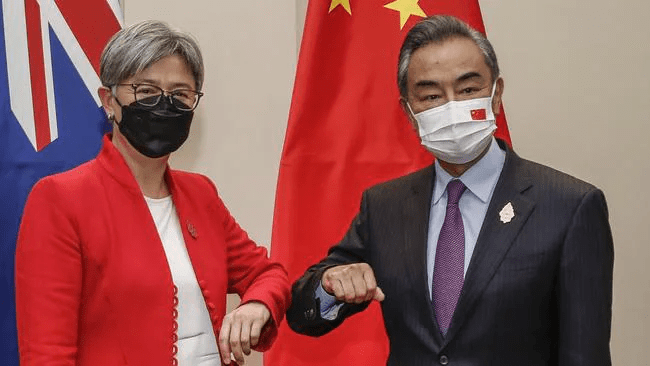Eric's Insight: Be cautiously optimistic about future of China-Australia ties

Chinese foreign minister Wang Yi meets with his Australian counterpart Penny Wong on July 8 in Bali, Indonesia. Online photo
Australia is a complex of contradictions. On the one hand, it is mentally loaded with western ideas, but on the other the country physically belongs to the Asia-Pacific region. As a result, Australia shows a high degree of ambivalence in getting along with its Asian neighbors, China in particular.
In spite of the Australian economic dependence upon the Chinese market, the China-Australia relations have been politically marred over the past decade along with the US rebalance policy by the Obama administration and the Indo-Pacific Strategy of the followup administrations headed by Trump and Biden.
Fortunately, the recent months have seen the possibilities of a rebound for China-Australia relations, mainly because Anthony Albanese was elected new prime minister in Canberra in the stead of Hawkish Scott Morison and the ministerial level contacts were resumed between the two countries.
Chinese defense minister Wei Fenghe had an ice-breaking talk with his Australian counterpart Richard Marles during the Shangri-La security dialogue in Singapore in mid-June, which was followed by a meeting between the foreign ministers of China and Australia at the Group of 20 meeting in Bali, Indonesia in early July -- the first time in almost three years.
As a result, some observers in the two countries and beyond began to discuss the recovery of the China-Australia ties that have been chilling over the years. Actually, it is still too early to say the bilateral relations are bouncing back, but we can be cautiously optimistic about the future of the ties from a historical point of view.

The Chinese Charm concert is staged in Canberra, Australia on July 30. Xinhua photo
For one thing, Australia will continue working as an American ally in the region. Following the end of the Second World War, the U.S. emerged as a world hegemon, and in 1951 the Australia, New Zealand and the United States Pacific Security Treaty was signed.
Since then, Australia has been a staunch ally of the U.S., and the Australian foreign policy to China has been largely in tune with that of the U.S.. In the early days of the Cold War, for instance, the Australian government followed the U.S. policy of estrangement against China, unwilling to recognize the legitimacy of the newly-founded People’s Republic of China.
The Australian tendency to follow its US big brother looked even more evident over the past decade, together with the incremental Chinese influence in the Asia-Pacific region and the China-US competition. This was highlighted by unfriendly laws against China during the Turnbull government and Australian baseless Covid-19 accusations against China by the Morison administration.
For another, when China and the U.S. officially established diplomatic ties in 1972, the Australian government also began its contacts with China in diverse fields. Under the globalization drive led by the US in the 1990s and 2000s after the Cold War, China and Australia have seen thriving trade and economic cooperation.
At some point, Australia took great care of its economic ties with China amid the Sino-US political rows. For instance, Canberra once resisted US appeals to apply tougher trade sanction against China, with the Australian officials working actively to dissuade their US counterparts from linking the Chinese most favoured nation (MFN) status to other political issues.
Even in the recent years when Australia followed the US steps closely and China-Australia ties fell into successive lows, the Australian side still tried more than once to contact the Chinese side, in a bid to secure its commodities occupying a due share of the huge Chinese market. As days went by, both sides realized the needs to resume cooperation, especially in economy.
So long as Australia puts more attention to its geographical identity as an Asian-Pacific country, regarding China as an opportunity for its lasting prosperity, while China tries harder to understand the Australian cultural identity as an western country, as well as its role of an American close ally, we still have some reason to be optimistic about the future of China-Australia ties.

A consumer buys fruits at an Australian supermarket in Canberra on July 27. Xinhua photo
(The writer Eric Wang Shixue is an English editor with the Mekong Magazine based in Kunming, Yunnan province. The view in the article does not necessarily represent that of Yunnan Gateway.)








